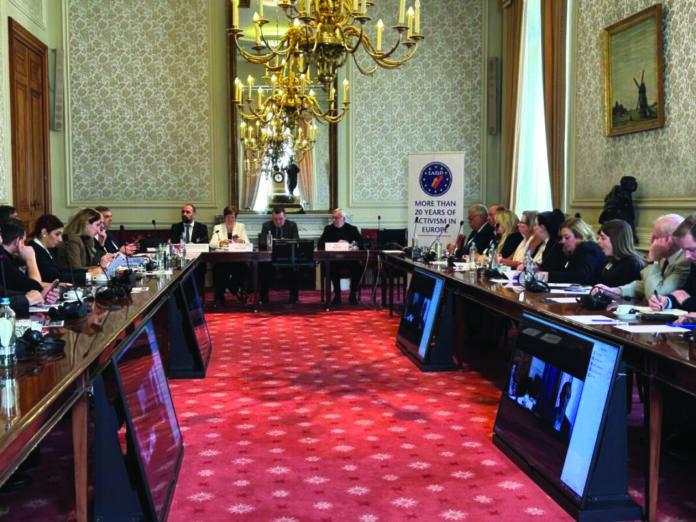BRUSSELS (Public Radio of Armenia) — A roundtable discussion titled “The Geopolitical Developments in the South Caucasus: Focus on Armenia and Artsakh took place at the Belgian Senate.” The event, hosted by Senator Mark Demesmaeker (N-VA) in collaboration with the European Armenian Federation for Justice and Democracy (EAFJD), was widely attended by a diverse audience comprising Belgian parliamentarians, diplomats, journalists, and civil society representatives.
The roundtable featured four keynote speakers: Els Van Hoof: Chair of the Foreign Affairs Committee, Belgian Federal Parliament; Paul Meerts: International negotiation analyst and co-founder of Clingendael Institute; Gegham Stepanyan, Ombudsman of Nagorno Karabakh and Benyamin Poghosyan: Senior Research Fellow at the Applied Policy Research Institute of Armenia and regular columnist for the Armenian Mirror-Spectator.
The primary objective of the conference was a comprehensive analysis of geopolitical developments in the South Caucasus region since September 2020, particularly in light of the Nagorno Karabakh conflict. The speakers provided insights from various perspectives, including international law, human rights, and the response of the international community. Special emphasis was placed on mediation efforts, with a particular focus on the role of the European Union. Additionally, the panelists elaborated on future prospects, exit strategies, and concrete steps to safeguard the inalienable rights of the Nagorno Karabakh/Artsakh Armenians.
The event commenced with opening remarks delivered by Senator Demesmaeker, the Deputy Head of Mission of Armenia to the EU, Vardan Sargsyan, and the President of the EAFJD Kaspar Karampetian.
Mark Demesmaeker said, “I’m honored to host this crucial roundtable at the Belgian Senate. We must stay vigilant and prioritize this evolving situation on our collective agenda. Having visited Nagorno-Karabakh and the border region with Azerbaijan, I’ve seen the conflict’s impact firsthand. Azerbaijan’s aggression and the ethnic cleansing of Nagorno-Karabakh/Artsakh, is utterly unacceptable. We need to pressure the EU and the international community to end impunity. Democracies must unite to safeguard human rights and prevent atrocities. It’s vital not to overlook the South Caucasus amidst the focus on the Middle East and Ukraine. We cannot ignore the suffering and instability in this region.”
Van Hoof stated: “The recent demolition of Artsakh’s parliament symbolizes Azerbaijan’s ongoing cultural cleansing. We cannot remain silent on this matter. The EU must reevaluate its relations with Azerbaijan and utilize its available policy tools to halt the violations of the fundamental rights of the Karabakh Armenians. Additionally, the option to impose sanctions should be considered on the European level.”










